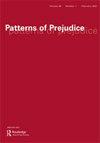Viral sticks, virtual stones: addressing anonymous hate speech online
IF 0.8
2区 社会学
Q4 ETHNIC STUDIES
引用次数: 2
Abstract
ABSTRACT Woods and Ruscher examine hate speech as a multifaceted phenomenon that has adapted to novel communication contexts and opportunities. In particular, online communication represents a growing opportunity for individuals to engage in anonymous hate speech, a situation that merits additional research for several reasons. The authors posit, first, that this specific type of hate speech warrants focused research because it may not altogether fit into pre-established categories of hate speech events, a matter that may have implications for the likelihood of legal censure. Second, this incarnation of hate speech may be best understood in terms of constitutive harms, relative to other harms, that are themselves understudied. Finally, anonymous hate speech online may inflict unique and additional harms by virtue of the unique context of the Internet and the ease of anonymity for perpetrators. Woods and Ruscher provide an overview of research on the types and harms of hate speech, and a consideration of the impact both of anonymity and of the Internet on these harms, as well as describe an illustrative example of a type of hate speech online that is often anonymous—derogatory Internet memes—in an effort to encourage further research into this novel incarnation of words that wound.病毒棒、虚拟石头:解决网上匿名仇恨言论
Woods和Ruscher认为仇恨言论是一种多面性的现象,它适应了新的交流环境和机会。特别是,在线交流为个人提供了越来越多的机会,让他们参与匿名仇恨言论,出于几个原因,这种情况值得进一步研究。作者认为,首先,这种特定类型的仇恨言论值得重点研究,因为它可能不完全符合预先建立的仇恨言论事件类别,这可能意味着法律谴责的可能性。其次,这种仇恨言论的化身可能最好地理解为构成性伤害,相对于其他伤害而言,这些伤害本身就没有得到充分的研究。最后,由于互联网的独特背景和犯罪者的匿名性,在线匿名仇恨言论可能会造成独特和额外的伤害。Woods和Ruscher概述了仇恨言论的类型和危害的研究,并考虑了匿名性和互联网对这些危害的影响,同时描述了一种通常是匿名的网络仇恨言论的典型例子——贬损性的网络模因——以鼓励对这种新颖的伤人话语的进一步研究。
本文章由计算机程序翻译,如有差异,请以英文原文为准。
求助全文
约1分钟内获得全文
求助全文
来源期刊

Patterns of Prejudice
Multiple-
CiteScore
2.50
自引率
0.00%
发文量
11
期刊介绍:
Patterns of Prejudice provides a forum for exploring the historical roots and contemporary varieties of social exclusion and the demonization or stigmatisation of the Other. It probes the language and construction of "race", nation, colour, and ethnicity, as well as the linkages between these categories. It encourages discussion of issues at the top of the public policy agenda, such as asylum, immigration, hate crimes and citizenship. As none of these issues are confined to any one region, Patterns of Prejudice maintains a global optic, at the same time as scrutinizing intensely the history and development of intolerance and chauvinism in the United States and Europe, both East and West.
 求助内容:
求助内容: 应助结果提醒方式:
应助结果提醒方式:


